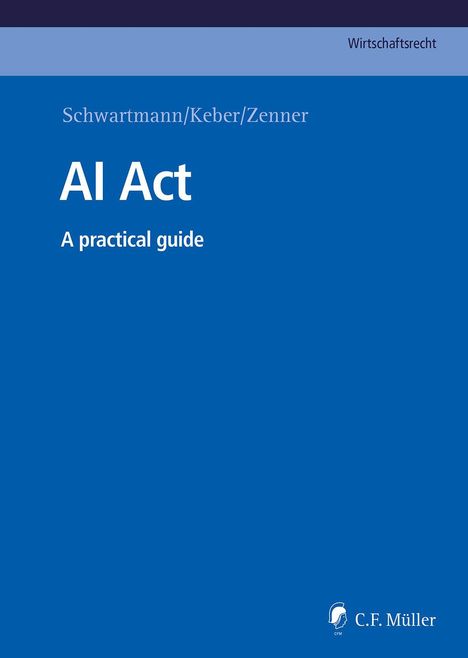AI Act, Flexibler Einband
AI Act
Lassen Sie sich über unseren eCourier benachrichtigen, falls das Produkt bestellt werden kann.
- Herausgeber:
- Rolf Schwartmann, Tobias O. Keber, Kai Zenner
- Verlag:
- Müller C.F., 01/2025
- Einband:
- Flexibler Einband
- ISBN-13:
- 9783811464117
- Gewicht:
- 552 g
- Maße:
- 240 x 170 mm
- Stärke:
- 18 mm
- Erscheinungstermin:
- 13.1.2025
Ähnliche Artikel
Klappentext
The new AI act will have significant consequences for civil society and the economy. The text will enter into force in the summer of 2024, the first provisions will apply just six months later. The aim of the European legislator was to provide better protection against the dangers of AI while at the same time promoting innovation.
In parallel to the beginning implementation of the AI Act, the practical guide tries to elaborate and asses the regulation systemically.
It provides legal users with an initial but reliable orientation when using the technology. In addition to the basics in the AI regulation itself; practice-relevant areas are classified in the annexes on high-risk AI systems. The use cases range from biometric identification of natural persons to questions of education as well as labor law to the use in the judiciary related to law enforcement and administration of justice. Special attention is paid to the comprehensible communication of the complex technical interrelationships in the use of artificial intelligence. In addition, the questions of the relationship to the other digital and data law of the EU, above all the GDPR, which arise in business practice, are assessed. This becomes particularly relevant, for example, in the case of transparency requirements, technical data protection and risk assessment. Finally, the work addresses practice-relevant liability issues and presents enforcement by the supervisory regime.
At a glance:
Classification of concrete use cases in regulation by the AI Regulation.
AI Regulation in distinction to the GDPR (e. g. transparency requirements, technical data protection and risk assessment).
Mediation of technical contexts in the implementation of legal obligations
Liability for AI
Checklists for the use of AI in the company
Professor Dr. Rolf Schwartmann is head of the Cologne Research Center for Media Law at the Cologne University of Technology and chairman of the Society for Data Protection and Data Security, as well as editor and author of numerous specialist publications on data protection and digital law. Professor Dr. Tobias Keber is the State Commissioner for Data Protection and Freedom of Information in Baden-Württemberg and previously conducted research on Artificial Intelligence at the Stuttgart Media University. Kai Zenner is Head of Office for MEP Axel Voss, EPP rapporteur for the AI Regulation and has been intensively involved in the negotiations for the adoption of the law. Besides, he is One AI Member (OECD) and advises the High Level Advisory Body on AI (HLAB AI) of the United Nations. In June 2023 he received the MEP Award for best Accredited Parliamentary Assistant for his work and dedication in the European Parliament.
#AI Act #AI #KI #artificial intelligence #künstliche Intelligenz
Biografie (Rolf Schwartmann)
Dr. Rolf Schwartmann, Inhaber der Professur für Bürgerliches Recht und Wirtschaftsrecht, insbesondere Internationales und Öffentliches Wirtschaftsrecht an der Fachhochschule Köln, Leiter der Kölner Forschungsstelle für Medienrecht.Anmerkungen:
Bitte beachten Sie, dass auch wir der Preisbindung unterliegen und kurzfristige Preiserhöhungen oder -senkungen an Sie weitergeben müssen.




